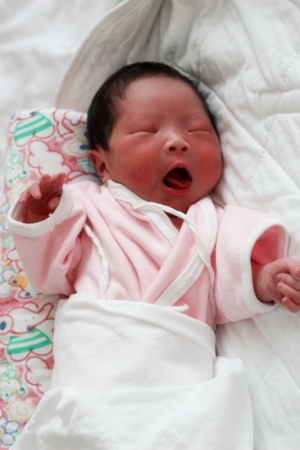Blood worth bottling

Dudu was born in good health late last year much to the relief of her father Zhao Peng and mother Yu Shan, who carries the rare Rh-negative blood type. Photo: Courtesy of Zhao Peng and Yu Shan
Zhao Peng and Yu Shan were so swept up in the joy of preparing for the birth of their baby daughter that nothing prepared the couple for the result of mother Yu's routine blood examination. The test in June last year revealed Yu's blood type was rhesus (Rh)-negative. Though accounting for around 15 percent of Caucasians, at around 0.3 percent it is extremely rare among China's majority Han ethnic group, according to statistics from the Beijing Red Cross Society. Its scarcity has earned it the nickname of "panda blood" in Chinese.
An Rh-negative mother such as Yu carrying an Rh-positive baby can give rise to significant health risks if the baby's blood gets into the mother's bloodstream. Yu's immune system could react to the D antigen in her baby's blood as if it were a foreign invader and produce antibodies against it. This process, known as sensitizing, is not usually harmful in a first pregnancy, however Yu suffered a miscarriage in 2002 which increased the chance of her antibodies passing through the placenta and attacking her baby's blood cells, causing anaemia, jaundice or in severe cases, heart or liver failure.
Pregnancy health risks
In some cases, newborns from an Rh-negative mother also risk contracting haemolytic disease that can affect a baby's physical and mental development.
"At first, my wife and I were really frightened by the serious health implications that could be caused by her rare blood type," recalled Zhao, who works for an Internet service provider.
Yu, a 36-year-old telecommunications professional, underwent a non-invasive surgery several years ago. However, her rare blood type wasn't identified during the procedure.
Having consulted doctors and enhanced their understanding about Yu's rare blood type, the married couple researched effective methods to minimize risks for both mother and baby.
"We joined an online support group for Rh-negative mothers and their families and got in touch with people who had shared the same experience as us. This gave us a lot of courage and hope," Zhao said.
With help from Lin Feng, founder of the online support group, Zhao bought anti-D immunoglobulin medicine from overseas to help prevent haemolytic disease. The medicine has been available in Europe since 1996 and in the US since 2004, however is still not available on the Chinese mainland. Thankfully, the medicine worked and on December 30 last year Yu gave birth to a healthy baby girl named Dudu.
Blood brothers and sisters
Beijing's health authority launched a blood donation drive in 2007 to boost supplies ahead of the Olympics. Rh-negative was earmarked as one of the most in-demand blood types, given only three out of every 10,000 Han people have "panda blood."
"Because of the scarcity of Rh-negative blood, people with it are disadvantaged compared to people with more common blood types in emergency medical situations when a transfusion is needed," Lin told the Global Times.
Lin, himself an Rh-negative blood carrier, discovered he was part of the exclusive club in 2002 when he was donating blood in the southern Chinese city of Shenzhen. He founded an online support group using popular chat software QQ under the aim of gathering people with panda blood to share their experiences and help each other.
The group made a life-saving difference in 2005 when 28-year-old Beijing taxi driver Ma Yongquan was stabbed in the leg by a thief. Ma was diagnosed in hospital with leucocythemia, a cancer characterized by the rapid growth of abnormal white blood cells. Ma's blood type, Rh AB-negative, left him with little hope of finding a desperately-needed blood transfusion.
Upon hearing the news, Lin contacted group members only to find none of the Beijing-based members carried the extremely rare blood type. Fortunately, a person with the blood type from Hangzhou, capital of east China's Zhejiang Province, was on a business trip to Beijing and his blood donation saved Ma's life.
Nevertheless, Lin said he had encountered traps from people looking to harvest "panda blood" for the black market. "Fraudsters sometimes appeal to those in need of Rh-negative blood to give money for a transfusion, only to disappear," he said. For this reason, no personal details are revealed to Web users who visit Lin's online support group.
Beijing's blood banks
In addition to the online support group, the Love Home of Beijing at the city's Red Cross Blood Center is a governmental charity that specializes in supplying rare blood to medical clinics.
The organization was founded in 2001 and now has more than 1,140 members in the capital. Over the past three years, about 700 people have regularly rolled up their sleeves to donate blood to the organization.
Zhong Qinglin, 49, has donated once or twice every year at voluntary blood donation buses since 2004 when he learned his blood type was Rh O-negative. Over the past eight years, Zhong has donated about 4.4 liters of blood - almost equivalent to an average adult's blood volume. Despite his generous efforts, his wife doesn't support his blood donations.
"I have donated 12 times, but only have 11 certificates that verify my blood donations," said Zhong.
"One was lost after I hid it from my wife, but I also failed to find it," he said with a smile.